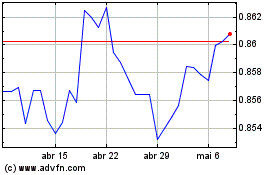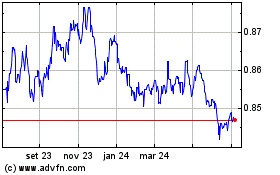Eurozone Industrial Production Grows Further
14 Setembro 2020 - 2:29AM
RTTF2
Eurozone industrial production grew at a slightly faster than
expected pace in July, as the economy attempts to sustain its
recovery from the slump caused by the coronavirus, or Covid-19,
pandemic. Industrial production rose 4.1 percent from June, when it
grew 9.5 percent, which was revised from 9.1 percent reported
initially, preliminary data from Eurostat showed on Monday.
Production gained for a third straight month. Economists had
forecast a 4 percent increase. Production growth continued to be
driven by the manufacture of capital goods, which rose 5.3 percent.
Durable consumer goods production grew 4.7 percent and output of
intermediate goods increased 4.2 percent. Manufacture of
non-durable consumer goods increased 3.9 percent and energy output
rose 1.1 percent.
Compared to the same month last year, industrial production fell
7.7 percent in July after a 12 percent slump in June, revised from
12.3 percent. Economists had expected an 8.2 percent decline.
Output had been decreasing in double-digits since March. In the EU,
industrial production grew 4.1 percent month-on-month after a 9.6
percent increase in the previous month. On a year-on-year basis,
production decreased 7.3 percent following an 11.3 percent slump in
June. Among the member states, the biggest monthly increases were
registered in Portugal, Spain and Ireland, while the worst falls
were observed in Denmark, Latvia and Belgium.
Euro vs Sterling (FX:EURGBP)
Gráfico Histórico de Câmbio
De Mar 2024 até Abr 2024

Euro vs Sterling (FX:EURGBP)
Gráfico Histórico de Câmbio
De Abr 2023 até Abr 2024
